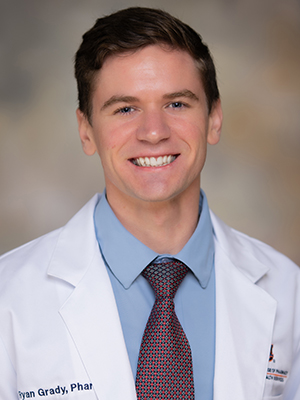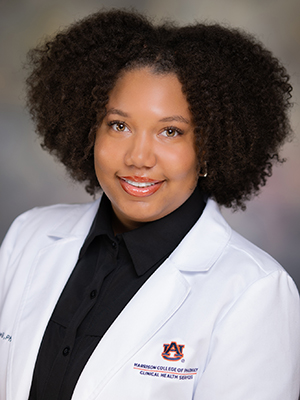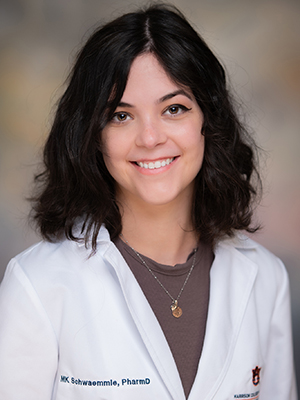Clinical Health Services offers both a PGY-1 Pharmacy Residency with emphasis in Ambulatory Care (four positions) and a PGY-1 Community Pharmacy Residency (one position). Residents gain unique experience in diverse patient care settings and have the opportunity to gain experience in ambulatory care, community pharmacy practice, administration, outcomes assessment, research, and teaching. Additionally, a teaching certificate is offered.
Auburn University is host to a unique ASHP-Accredited PGY-1 Pharmacy Residency position with a focus on primary care, community care, and academia. The residency is located in Auburn, Alabama, and is associated with multiple practice sites including the Auburn University Harrison College of Pharmacy, the Auburn University Pharmaceutical Care Center, the State Employees’ Insurance Board Wellness Center in Montgomery, and three patient-care oriented pharmacies.
Residents will gain experience and proficiency in crucial areas of pharmacy practice such as pharmacy benefit management, formulary management, contract negotiation, collaborative practice, establishment and expansion of pharmacy services, marketing of clinical pharmacy services, financial issues including reimbursement, and in the education of other health care professionals, patients, students, and the community. The program will provide the resident with the opportunity and stimulus to develop skills, competencies, and professional expertise in pharmacy practice.
Resident responsibilities will include:
The resident will receive an adjunct faculty appointment within the Department of Pharmacy Practice of the Harrison College of Pharmacy and have instructional duties as outlined above. In addition to the specified teaching responsibilities, the resident will have the opportunity to participate in a teaching certificate program.
In order to successfully complete the residency program the resident must complete 12 months of training in the program regardless of any unforeseen delays or leaves of absence.
Based on the resident’s interest and career goals, and planned individually with the RPD.
Participation with the Resident Teaching & Learning Program (RTLP) is optional, but a formal commitment to the program must be made within the first month of the training year.
Learn more about the Resident Teaching & Learning Program.
There are four PGY-1 pharmacy resident positions available. The term of the residency will be July 1 through June 30 (12 months). Remuneration for the one-year residency will be $45,000. Residents will be eligible for health insurance, paid leave and receive financial support to attend assigned professional meetings. Additionally, residents will have a dedicated office space, personal work laptop, and on-campus parking privileges.
Applicants must have earned a Doctor of Pharmacy degree from an ACPE accredited college or school of pharmacy, be registered for the resident matching program, and be eligible for Alabama licensure. Candidates selected for this position must be able to meet eligibility requirements to work in the United States at the time the appointment is scheduled to begin and continue working legally for the proposed term of employment.
If you are not graduating from a pharmacy school in the State of Alabama, it is imperative to recognize that the licensure requirements might be different than the state you are graduating from. For licensure, the Alabama Board of Pharmacy requires 1500 internship hours. A total of 400 traditional (Community and Health System Practice) hours need to be completed after your second year of pharmacy school. All of the internship hours worked in a different state need to be certified by that state board of pharmacy and submitted to the Alabama Board of Pharmacy. For further information, please go to www.albop.com. If you do not have 400 traditional hours completed after your second year of pharmacy school, please alert Dr. Brackett via email brackpd@auburn.edu or telephone 334-844-4099 as soon as possible for special arrangements.
Residents will be required to successfully complete and maintain American Heart Association Basic Life Support certification. Residents will also be required to successfully complete immunization certification.
Auburn University provides a unique ASHP-accredited PGY-1 Community-Based Pharmacy Residency position through Star Discount Pharmacy in Huntsville, Alabama. Star Discount Pharmacy operates six pharmacies where they provide many advanced and innovative community pharmacy services such as specialty (both URAC and ACHC accredited), compounding, medication therapy management (MTM), point-of-care testing, immunizations, group education, research, and much more. The partnership with Auburn offers the resident faculty mentorship in areas such as research, teaching, service development, and ambulatory care and will position the resident for careers in a variety of practice settings.
Residents trained in this program will gain over 2,000 hours of advanced education and training focused on developing patient care, practice management, and leadership skills. Additionally, residents will have the opportunity to conduct research and present at regional and national pharmacy conferences. The PGY-1 Community-Based Pharmacy Residency conducted by Auburn University, Auburn, Alabama.
Resident responsibilities will include:
The resident will receive an adjunct faculty appointment within the Department of Pharmacy Practice of the Harrison College of Pharmacy and have instructional duties as outlined above. In addition to the specified teaching responsibilities, the resident will have the opportunity to participate in a teaching certificate program.
In order to successfully complete the residency program, the resident must complete 12 months of training in the program.
The experiences listed are examples for informational purposes only. All listed activities will occur, but might not be in the format currently listed. For more information please contact the community-based residency program director Dr. Greg Peden at pedengc@auburn.edu.
The resident will have the opportunity to participate in a Teaching Certificate Program provided by faculty of the Harrison College of Pharmacy. Participation with the Resident Teaching & Learning Program (RTLP) is optional. Activities for the RTLP occur throughout the residency year. A formal commitment to the program must be made within the first month of the training year.
Learn more about the Resident Teaching & Learning Program.
There is one PGY-1 pharmacy resident position available. The term of the residency will be July 1 through June 30 (12 months). Remuneration for the one-year residency will be $45,000. Residents will be eligible for health insurance and paid leave. The resident will receive financial support to attend assigned professional meetings. Additionally, residents will have dedicated office space and a personal work laptop.
Applicants must have earned a Doctor of Pharmacy degree from an ACPE-accredited college or college of pharmacy and be eligible for licensure in Alabama. Candidates selected for this position must be able to meet eligibility requirements to work in the United States at the time the appointment is scheduled to begin and continue working legally for the proposed term of employment.
If you are not graduating from a pharmacy school in the State of Alabama, it is imperative to recognize that the licensure requirements vary from state to state. For licensure, the Alabama Board of Pharmacy requires 1500 internship hours. A total of 400 traditional (Community and Health System Practice) hours need to be completed after the second year of your pharmacy program. All of the internship hours worked in a different state need to be certified by that state board of pharmacy and submitted to the Alabama Board of Pharmacy. For further information, please go to www.albop.com. If you do not have 400 traditional hours completed after your second year of pharmacy school, please alert Dr. Peden via email pedengc@auburn.edu or telephone 334-844-4099 as soon as possible for special arrangements.
Residents will be required to successfully complete and maintain American Heart Association Basic Life Support certification. Residents will also be required to successfully complete immunization certification.

Ambulatory Care Pharmacy Resident
mrg0092@auburn.edu
Dr. Ryan Grady is a native of Athens, Georgia. He earned a bachelor of science degree in biological sciences from the University of Georgia in 2020 and continued with his Pharm.D., graduating in 2025. He previously worked as a pharmacy technician and intern with Kroger Pharmacy and was a pharmacy intern with St. Mary’s Hospital. His career goals include being an ambulatory care pharmacist and potentially pursuing a PGY-2 residency in ambulatory care. In his spare time, he enjoys mountain biking, climbing, running, and spending time with family and friends.

Ambulatory Care Pharmacy Resident
lfm0014@auburn.edu
Dr. Lauren Mikell is a native of Conyers, Georgia. She earned her Pharm.D. from Purdue in 2025. She previously worked with CVS Pharmacy as a pharmacy intern. She is interested in cardiology, diabetes, anticoagulation, and health equity initiatives. In her spare time, she enjoys spending time with friends and family, watching NFL football (Pittsburgh Steelers fan), playing sports, trying new places such as restaurants, singing, and binge watching shows and movies.

Ambulatory Care Pharmacy Resident
mds0076@auburn.edu
Dr. MaryKate (MK) Schwaemmle is a native of Cumming, Georgia. She earned her Pharm.D. from Auburn in 2025. She previously worked as a pharmacy intern with Goodson’s Drugs. She is interested in ambulatory care, specifically in relation to cardiology and pulmonology. In her spare time, she enjoys reading, watching scary movies, writing and spending time with friends and family.